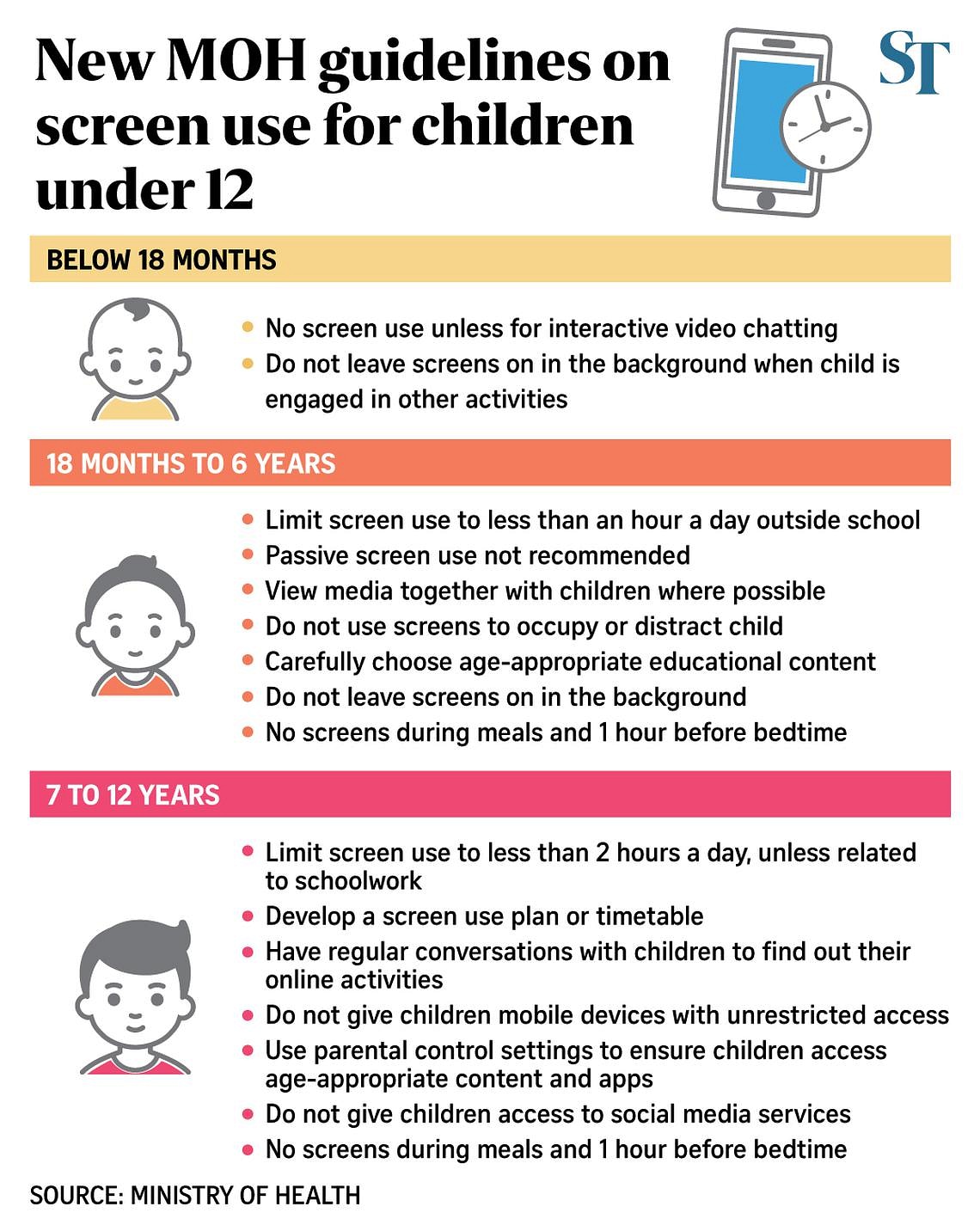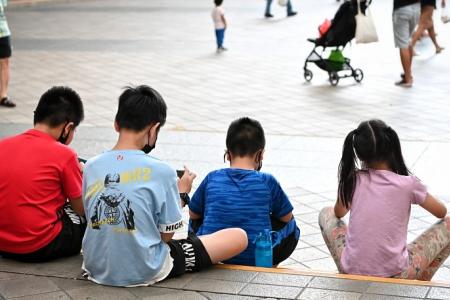Singapore issues stricter guidelines on screen use for children
Children younger than 18 months old should not be allowed screen use or be exposed to screens in the background.
Background screen use refers to having the television or other devices turned on in the background even when a child is not watching them.
These are part of stricter and clearer guidelines on screen use that the Health Ministry (MOH) has provided for children up to 12 years of age. Previous editions had discouraged the use of screens and recommended caregivers to reduce background screen exposure.
The updated guidelines, launched on Jan 21, are part of a new national health strategy to encourage children and adolescents to adopt healthier lifestyles. This will focus on those up to 12 years of age, with plans to later extend it to older children.
In a joint statement, MOH, the Ministry of Education (MOE) and Ministry of Social and Family Development (MSF) said that children in Singapore face health risks from inactive lifestyles with excessive screen time, poor nutrition, and inadequate sleep and physical activity.
This new initiative, called Grow Well SG, aims to reduce the risk of poor health and development in children through the combined efforts of families, schools, healthcare institutions and the community.
Speaking at a press conference at Temasek Primary School on Jan 21, Health Minister Ong Ye Kung said that though the first set of screen use guidelines were released in March 2023, research since then has shown a stronger correlation between screen use and cognitive development in young children.
More decisive and effective measures are needed to shape children’s device usage habits as it affects their physical activity, social interactions and emotional well-being, he said.
“Now knowing more, we are strengthening that advisory... This is stronger than the previous guidance and includes even background screen use, such as TV, which some families tend to switch on while having meals,” he added.
Other updates include limiting screen use outside of school to less than one hour a day for children between the ages of three and six, and double that duration for those aged seven to 12 years old.
Parents should also not give their young children unrestricted access to mobile devices, or any access to social media.
From February, all pre-schools will also need to follow an updated Code of Practice which will specify that infants up to 18 months should not have any screen time. Screens will only be used for teaching and learning purposes for children aged 18 months to six years.
For primary and secondary schools, MOE has provided more detailed guidelines on managing students’ use of smartphones and smartwatches from January.
These include having handphone storage spaces at designated areas for students to deposit their phones before lessons start and using mobile devices only in designated areas at appropriate times like during recess and after school.
Some schools already have their own guidelines concerning devices. Primary schools for instance do not allow any handphone use when students are in school at all times, while secondary schools generally do not let students use phones during lessons.

Singapore’s national strategy - which also covers other aspects like sleep and nutrition - comes after the United States Surgeon-General Vivek Murthy in June 2024 warned that social media use can harm adolescents’ mental health.
Amid increasing awareness of the harmful effects of excessive screen time, several countries have taken steps to regulate screen use among youth.
In January, a law was signed in Brazil restricting smartphone usage in elementary and high schools.
Australia late in 2024 passed a law banning children under 16 from accessing social media, in one of the strictest laws on online harms to date.
Locally, cohort studies such as Growing Up in Singapore Towards Healthy Outcomes (Gusto) and Singapore Longitudinal Early Development Study (SG LEADS), have shown strong links between screen use and cognitive development in infants and toddlers.
One key finding is that inappropriate and excessive use of devices leads to poorer language skills and shorter attention spans for children.
For older children, screen use comes at the expense of other important factors of development such as sleep, physical activity and social interaction.
Most recently, a local study conducted by researchers from the Institute of Mental Health found that 46.4 per cent of Singaporeans between the ages of 15 and 21 had problematic smartphone use.
Mr Junior Ong, 44, a real estate agent, said that like many parents, he and his wife, a sales professional, sometimes let both their children watch Peppa Pig episodes on their mobile devices during meals.
That being said, they are stricter than most when it comes to how much screen time they give their seven-year-old daughter and four-year-old son.
In total, each child is allowed about one hour of screen use per week, apart from the rare occasions they are allowed to use screens during meals when their parents cannot attend to them.
Said Mr Ong: “I believe if parents work together with us, these measures, even though not mandatory by law, will over time go a long way to shape the habits of our young.”
Get The New Paper on your phone with the free TNP app. Download from the Apple App Store or Google Play Store now


